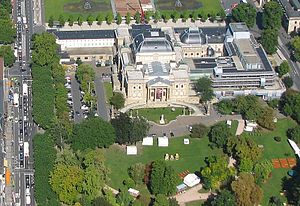Susan Owen, also known by her married name Susan Owen-Leinert, is an American operatic soprano, voice teacher, and opera director. She had an active international performance career during the 1980s and 1990s. She currently is the head of the vocal arts division at the Rudi E. Scheidt School of Music at the University of Memphis and serves as General Manager of The Chamber Opera of Memphis.

The Hessisches Staatstheater Wiesbaden, also known as the Staatstheater Wiesbaden or Theater Wiesbaden, is a German theatre located in Wiesbaden, in the German state of Hesse. The company produces operas, plays, ballets, musicals and concerts on four stages. It has a resident orchestra, the Hessisches Staatsorchester. The theatre was inaugurated in 1894.

Lolita (Лолита) is an opera in two acts by composer Rodion Shchedrin. Composed in 1992, it uses a Russian language libretto by the composer which is based on Vladimir Nabokov's 1955 novel of the same name, written in English. The opera premiered in 1994 at the Royal Swedish Opera, Stockholm, using a Swedish language translation of the original libretto.
Tatjana Gürbaca is a German opera director of Turkish and Slovenian descent. Based at the Staatstheater Mainz from 2011 to 2014, she directed operas internationally, including contemporary operas and world premieres.

Gaston Rivero is an Uruguayan-US American operatic tenor.
Heather Engebretson is a Chinese-American operatic soprano who made a career mostly in Europe. Based at German opera ensembles for several years, she has worked freelance from 2017, and widened her repertoire from coloratura roles to leading characters such as Puccini's Madama Butterfly. She has been praised for her convincing acting as well as the expressiveness of her lyric voice, with performances including the Royal Opera House in London, the Bolshoi Theatre and Oper Frankfurt.

Albert Horne is a South African-born chorus master and orchestral conductor, whose focus is opera chorus preparation and operatic performances. He worked for the Cape Town Opera and has been chorus master and conductor at the Hessisches Staatstheater Wiesbaden since 2014.
Stefano La Colla is an Italian tenor who has given recitals and performed in opera internationally.

David Hermann is a German-French stage director focused on opera. In 2006, Hermann was the youngest stage director at the Salzburg Festival, and he has directed operas at major opera houses in Europe.

Uwe Eric Laufenberg is a German actor, stage director for play and opera, and theatre manager who has directed at international opera houses and festivals, such as Elektra at the Vienna State Opera and Parsifal at the Bayreuth Festival.

Cristina Pasaroiu is a Romanian operatic soprano who has performed leading roles at major European opera houses, with a focus on French repertoire such as Bizet's Micaëla, Massenet's Manon and Gounod's Juliette.

Johannes Hill is a German baritone in concert and in oratorios, who has performed internationally. Singing in choirs from age 10, he has performed major roles in oratorios, such as both Jesus and Pilate in Bach's Passions, and Pope Francis in the premiere of Laudato si'. He has also performed in vocal ensembles such as Kammerchor Stuttgart and Collegium Vocale Gent.
Britta Stallmeister is a German operatic soprano. A member of the Oper Frankfurt from 1998 to 2015, she has appeared in major European opera houses and international festivals. She has performed in premieres, and in recitals and recordings.
Hartmut Welker is a German operatic bass-baritone.
Ruthild Engert-Ely was a German operatic mezzo-soprano and alto.
Endrik Wottrich was a German operatic tenor.

Silvia Weiss is a German operatic and concert soprano who performed at major international festivals, first mainly in concerts but from 1997 increasingly on opera stages, in roles such as Mozart's Elvira in Don Giovanni and Konstanze in The Abduction from the Seraglio. She recorded operas by Hans Werner Henze, Ernst Krenek and Ernst Toch.

Claus Guth is a German theatre director, focused on opera. He has directed operas at major houses and festivals, including world premieres such as works of the Munich Biennale, and Berio's Cronaca del luogo at the Salzburg Festival in 1999. Guth is particularly known for his opera productions of the works of Richard Wagner and Richard Strauss. He has received two Faust awards, for Daphne by Richard Strauss in 2010, and for Debussy's Pelléas et Mélisande, both at the Oper Frankfurt.
Daniela Kerck is a German scenic designer and stage director who has worked internationally. She directed and created the stage for Jörg Widmann's opera Babylon that opened the 2022 Internationale Maifestspiele Wiesbaden in 2022, and again for Puccini's Turandot for the 2024 festival. Her staging of the world premiere of Søren Nils Eichberg's Oryx and Crake was nominated for the 2023 International Opera Awards.











